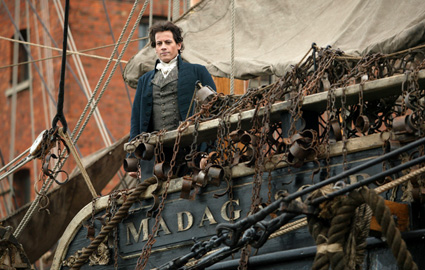

Reviews of Recent Independent, Foreign, & Documentary Films in Theaters and DVD/Home Video
Directed by Michael Apted. Written by: Steven Knight. Produced by: Edward R. Pressman, Terrence Malick, Patricia Heaton, David Hunt, & Ken Wales Director of Photography: Remi Adefarasin. Edited by: Rick Shaine. Music: David Arnold. Released by: Samuel Goldwyn Films/Roadside Attractions. Country of Origin: UK. 120 min. Rated PG. With: Ioan Gruffudd, Albert Finney, Romola Garai, Benedict Cumberbatch, Ciaran Hinds, Michael Gambon, Rufus Sewell, Toby Jones & Youssou N'Dour. This biopic of William Wilberforce (Ioan Gruffudd) marks the 200th anniversary of the abolition of the slave trade in the British Empire. A member of Parliament, Wilberforce led the legislative effort, and Amazing Grace becomes a crackling good political story covering this part of his life. It is here that the film becomes involving as it thrusts into Wilberforce’s barnstorming, lobbying, and parliamentary maneuvering, though the politics are sometimes hard to follow. Americans tend to have little familiarity with issues of the British slave trade or the details of slave importation before the U.S. constitutional ban in 1808 or of rebellions in the West Indies, so historical facts fly by quickly. Wilberforce faces accusations of sedition amidst panic over the French Revolution, set off by his correspondence with Thomas Jefferson, supporter of the Revolution. Prime Minister William Pitt (Benedict Cumberbatch) advises his friend, “When the people stop being afraid, they rediscover their compassion.” Wilberforce takes this to heart and learns to play politics by playing a lawyerly trick – to oppose just the slave trade, not the monarchy or patriotism. This half of the film is also enlivened by superb British actors who, with relish, embody the film’s historical figures. Michael Gambon, in a small role as Lord Charles Fox, a late convert to Wilberforce’s cause, effectively replays a crafty Grand Old Man of politics like his LBJ in Path to War. Representing the Liverpool port interests, Ciaran Hinds’ Lord Tarleton makes energetic parliamentary retorts, declaiming the importance of the slave trade to the British economy. John Newton (Albert Finney), a haunted, caustic ex-slave trader doing penance as an evangelical minister, invigorates Wilberforce’s ruminations, but Finney’s performance succumbs to sentimentality as his recalls his authorship of the title hymn. Additionally, Toby Jones is a too stereotypical powdered fop as the racist Duke of Clarence condoning slavery. Steven Knight’s script takes much too long to make this history come alive. The first half drags Wilberforce through the most dispiriting times of his life, which included a stress-related laudanum addiction. Time shifts with headings like “15 Years Previous,” “5 Years On,” then “Present Time,” without dates. Too much time is spent on Wilberforce’s quick courtship of hero-worshipping, bosom-heaving Barbara Spooner (Romola Garai). With the horrors of the Middle Passage left mostly to Wilberforce’s Uncle Tom’s Cabin-like nightmares, Amistad more effectively incorporated testimonials with legal issues.
Until Pitt and Reverend Newton inspire Wilberforce to combine his political vocation with his religious zeal, Gruffudd only comes alive
as a handsome guy dashing off ripostes on the floor of the House of Commons who would otherwise be a depressed guest at home or at a men’s club. Rufus
Sewall contributes to the dourness of the first half as Thomas Clarkson, a fanatical abolitionist earning his sobriquet as one of “The Saints,”
until he throws himself into lobbying efforts. Singer Youssou N’Dour, in his acting debut, gives quiet dignity to the amazing real life of ex-slave
and anti-slavery activist Olaudah Equiano. While these committed idealists are shown to well deserve their niches in Westminster Abbey, as seen in the film’s closing, Amazing Grace is nevertheless a confusing and only half-successful tribute.
Nora Lee Mandel
|